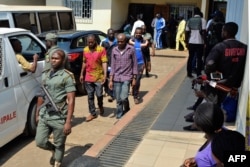English-speaking Cameroonians, who say they are fed up with an ongoing separatist war, are taking matters into their own hands by arresting and handing over suspected separatist fighters to the military. Some residents also have created militias in their towns and villages as they voice frustration over the war that has killed close to 2,000 people.
In the English-speaking village of Pinyin, a man shouts alongside scores of people who voice jubilation over the arrest of four separatist fighters.
Among the residents is 45-year-old butcher Peter Ndifor, a village self-defense group member. Ndifor says he participated in the arrests because the situation has worsened by the day since the war started in 2017. He says people are dying and businesses are crumbling.
"At first, we used to slaughter about five, six cows a day, but presently now we slaughter just one or two and it does not get finished [we hardly sell all of it] again," he said. "It [The crisis ] has affected my business a lot."
The suspected separatists, armed with locally-made guns, were overpowered by the huge crowd that attacked their hideout. The four men did not shoot, but received severe beatings before they were handed to the military.
Separatists have said on social media that the arrested men are not their fighters. They say the armed men may either have been taking advantage of the fight to kidnap people for ransom or were sent by the government to disguise themselves as fighters in order to attack and give information to the military.
Cameroon's unrest began in 2016 when English-speaking teachers and lawyers protested the growing dominance of the French language in the officially bilingual country.
The government responded with a crackdown and separatists began using weapons against the military, alleging that they were defending their people and fighting for their independence
Last week, attacks on suspected separatist fighters were reported in the English-speaking southwestern towns of Mutengene and Tiko.
Political analyst Gilbert Mbah says many people have voiced irritation with the war because there is no end in sight and conditions are worsening.
"The population is really fed up with it [the crisis]," he said. "Three years is not three days. The economy is really down. Children in the house, no food, no school, everything. I mean, it is really very bad."
Cameroon has been using village militias on its northern border with Nigeria to fight Boko Haram terrorists with the hope the armed locals can prevent further attacks.
Paul Atanga Nji, Cameroon's minister of territorial administration, says the government is relying on such groups to defend their communities from intruders.
"Look at what is happening in the far north region," he said. "The vigilantic [self-defense] groups are very operational because there is that synergy between the vigilantic [self-defense] groups and the forces of law and order. When the suicide bombers are coming, they go and stop them. If we think that only the military can intervene, it becomes very difficult."
The militias live on donations and expect support from the government. This was the case with village militias on Cameroon's border with Nigeria.
Atanga Nji says the population should be watchful and collaborate with them, making sure that people with questionable character do not join them.
Cameroon's English-speaking Northwest and Southwest regions have been wracked with instability since fighting broke out. More than 1,800 people have been killed and a half-million internally displaced, according to the U.N.
A battle between the militias and the fighters in the English-speaking village of Mbot last week left two militias dead. Six suspected separatists also were killed.
The violence has also kept more than 600,000 children out of school and disrupted health care services as well as the economy.





